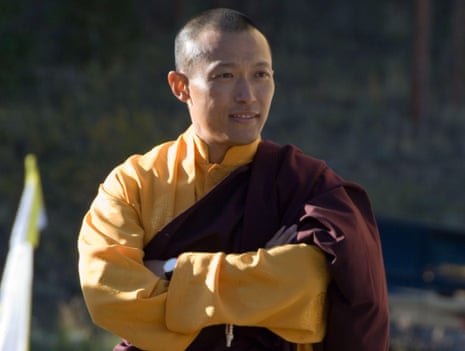The head of one of the west’s largest Buddhist groups has stepped down while allegations of sexual assault and misconduct are investigated.
Sakyong Mipham Rinpoche, the leader of the Shambhala Buddhist community – an organisation with more than 200 meditation centres globally – will “step back from his administrative and teaching responsibilities”, a statement said.
He resigned after the publication of a report on sexual misconduct within the group, which included stories from women who claim he sexually assaulted them. The report, by a leadership coach and active member of the US Shambhala community, Andrea Winn, also claims Shambhala International ignored the issue.
It includes stories claiming the sakyong – which translates as king, emperor or governor – sexually assaulted women when drunk and used kusung (volunteers who assist him) “to procure women students for his own sexual gratification”.
He has not responded specifically to the recent allegations but said he fully supported an investigation and wanted to allow the time and space for it to proceed. He had previously apologised for hurt caused by past relationships with women in his community.
The report says the allegations point to “a pattern of behaviour”. Conducted with the assistance of Carol Merchasin, a retired lawyer and sexual misconduct investigator, it says: “Shambhala International was aware of these actions and did nothing.”
The news follows the resignation of nine members of the Shambhala organisation’s highest leadership body. A law firm in Halifax, Nova Scotia, where the community has its headquarters, has been hired to investigate allegations against the community’s leader.
The international leaders of Shambhala, the Kalapa council, said: “We recognise that parts of our system are broken and need to dissolve in order to make room for real change.”
Before resigning, the Kalapa council said it took “the allegations of misconduct within our community very seriously and is working on a path forward to address [them]”.
In a previous statement, Shambhala International said the organisation was looking into past “abhorrent sexual behaviour”.
“In our complex history there have been instances of sexual harm and inappropriate relations between members and between teachers and students. We are still emerging from a time in which such cases were not always addressed with care and skill,” a statement posted on Shambhala’s Facebook page said.
Shambhala also announced a change in the way it handles and reports sexual assault allegations.
Last month Mipham issued an apology for hurt caused by past relationships with women in his community. In a letter, he wrote: “There have been times when I have engaged in relationships with women in the Shambhala community. I have recently learned that some of these women have shared experiences of feeling harmed as a result of these relationships. I am now making a public apology.”
Winn welcomed the sakyong’s decision to step aside during the investigation, saying: “I am very happy [about this] decision.”
Merchasin welcomed the formal investigation. “These are credible people and if the council believe these allegations are not true then they now need to conduct a very thorough investigation,” she said.
“The allegation is that these people were used to procure women for sex for the sakyong. I want to make it clear that it is not just a number of women who have come forward but what other people have also had to say.”
The report includes three accounts from anonymous women who closely served Mipham. The women alleged that the encounters took place at or after alcohol-fuelled private parties thrown for the head of Shambhala.
“When I first began to be invited to these parties, I was elated. I felt as though my devotion was being recognised and acknowledged and that I now genuinely ‘belonged’,” wrote one woman featured in the report.
She claimed that over the years, when the sakyong was “completely intoxicated”, he kissed and groped her while “aggressively encouraging” her to go to bed with him. She alleges that she resisted his advances for years and only ended up sleeping in his bed on one night, during which she spent most of the time holding a bowl for him to vomit into.
According to her account, when she confronted her teacher about his treatment of women, he “said that he was sorry, that he had not meant to hurt me” and after that she was gradually relieved of her tasks in his “inner circle”.
Another woman said: “Over many years I had several sexual encounters with the sakyong that left me feeling ashamed, demoralised and worthless. Like many young women in the sangha [community] I was deeply devoted to the sakyong and did whatever I could to serve him and be close to him. I witnessed the steady stream of attractive women that were invited into his quarters and I longed to be the one that he fell in love with and was worthy of being his wife.”
Merchasin said that since the publication of the report other women had come forward to share their stories. “I would rather not say the numbers but there are others. A woman who just came forward has given me names of several other women affected.”
